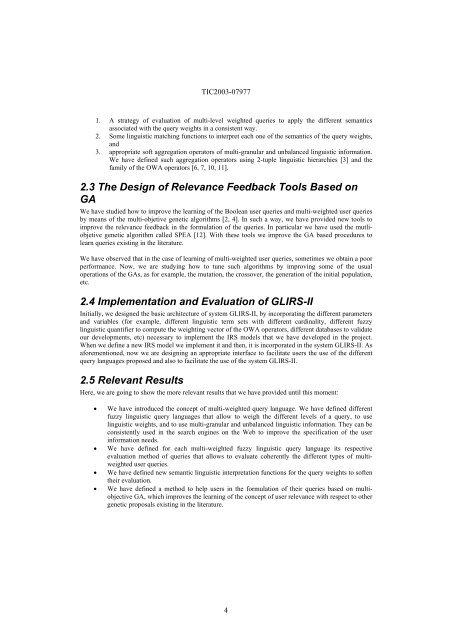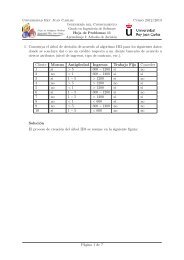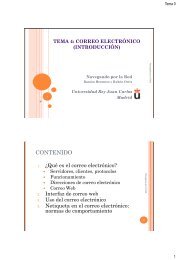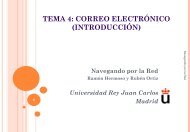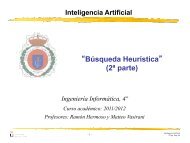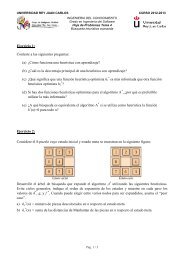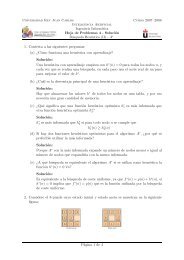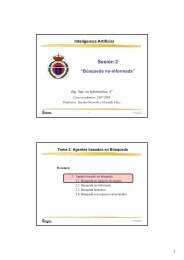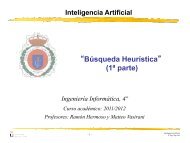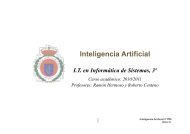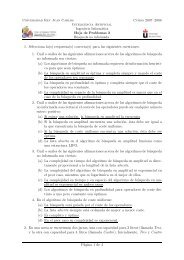- Page 1 and 2: Jornada de Seguimiento de Proyectos
- Page 3: TIC2003-07977 system models and an
- Page 7 and 8: TIC2003-07977 5. E. Herrera-Viedma,
- Page 9 and 10: Jornada de Seguimiento de Proyectos
- Page 11 and 12: 2003 2004 2005 2006 2007 Q3 Q4 Q1 Q
- Page 13 and 14: 3.4 Risk management TIC2003-02737-C
- Page 15 and 16: TIC2003-02737-C02 UCLM-3, and UCLM-
- Page 17 and 18: TIC2003-02737-C02 5 Conclusions and
- Page 19 and 20: TIC2003-02737-C02 [36] M. Ferreira,
- Page 21 and 22: Jornada de Seguimiento de Proyectos
- Page 23 and 24: TIC2003-06293 is a particular form
- Page 25 and 26: TIC2003-06293 The importance of usi
- Page 27 and 28: TIC2003-06293 9 Lera, I., C. Juiz,
- Page 29 and 30: Jornada de Seguimiento de Proyectos
- Page 31 and 32: TIC2003-03654 dynamic adaptation fo
- Page 33 and 34: TIC2003-03654 Int. Journals Confere
- Page 35 and 36: TIC2003-03654 the laboratory from o
- Page 37 and 38: Jornada de Seguimiento de Proyectos
- Page 39 and 40: 2 Project objectives TIC2003-08763-
- Page 41 and 42: TIC2003-08763-C02 features (complet
- Page 43 and 44: TIC2003-08763-C02 • General disse
- Page 45 and 46: TIC2003-08763-C02 4.3 Relations wit
- Page 47 and 48: TIC2003-08763-C02 • XXII World Co
- Page 49 and 50: TIC2003-08763-C02 [17] Franziska Kl
- Page 51 and 52: TIC2003-08763-C02 [39] Carles Sierr
- Page 53 and 54: TIC2003-09481-C04 specially Maribel
- Page 55 and 56:
TIC2003-09481-C04 Figure 2: One of
- Page 57 and 58:
Frequency 1 0,8 0,6 0,4 0,2 TIC2003
- Page 59 and 60:
TIC2003-09481-C04 [Arenas et al., 2
- Page 61 and 62:
Jornada de Seguimiento de Proyectos
- Page 63 and 64:
Introduction to INSPIRE TIC2003-093
- Page 65 and 66:
TIC2003-09365-C02 6. Put in practic
- Page 67 and 68:
3. Result indicators TIC2003-09365-
- Page 69 and 70:
TIC2003-09365-C02 7) Collaboration
- Page 71 and 72:
TIC2003-09365-C02 8) Open software
- Page 73 and 74:
TIC2003-09365-C02 services. Collabo
- Page 75 and 76:
4. References TIC2003-09365-C02 [1]
- Page 77 and 78:
TIC2003-09365-C02 Galicia. Actas de
- Page 79 and 80:
TIC2003-09365-C02 de España (JIDEE
- Page 81 and 82:
TIC2003-08807-C02 developed in the
- Page 83 and 84:
TIC2003-08807-C02 • To develop th
- Page 85 and 86:
TIC2003-08807-C02 2 Project progres
- Page 87 and 88:
TIC2003-08807-C02 creation of a lin
- Page 89 and 90:
TIC2003-08807-C02 [3] Cuéllar M. P
- Page 91 and 92:
TIC2003-08807-C02 [33] José Jesús
- Page 93 and 94:
1 Objectives of the project TIC2003
- Page 95 and 96:
TIC2003-08687-C02 In a fist stage w
- Page 97 and 98:
TIC2003-08687-C02 maintain the use
- Page 99 and 100:
TIC2003-08687-C02 general context i
- Page 101 and 102:
TIC2003-08687-C02 sium on Artificia
- Page 103 and 104:
TIC2003-08687-C02 [18] Angel Mora,
- Page 105 and 106:
TIC2003-00950 These algorithms, exc
- Page 107 and 108:
TIC2003-00950 We are currently work
- Page 109 and 110:
TIC2003-00950 reasoning by incorpor
- Page 111 and 112:
References TIC2003-00950 [1] Alsine
- Page 113 and 114:
TIC2003-04564 does not allow to dis
- Page 115 and 116:
TIC2003-04564 Hernández, E., Recas
- Page 117 and 118:
2 Main Objectives TIC2003-04153 The
- Page 119 and 120:
TIC2003-04153 4 Summary of main res
- Page 121 and 122:
TIC2003-04153 Current Topics in Art
- Page 123 and 124:
Jornada de Seguimiento de Proyectos
- Page 125 and 126:
TIC2003-08681-C02 • For the speec
- Page 127 and 128:
TIC2003-08681-C02 • Design of a n
- Page 129 and 130:
3.3 Technology transfer TIC2003-086
- Page 131 and 132:
TIC2003-08681-C02 • C. D. Martín
- Page 133 and 134:
TIC2003-08681-C02 - Automatically i
- Page 135 and 136:
Jornada de Seguimiento de Proyectos
- Page 137 and 138:
TIC2003-9001-C02 (a) Multi-lattices
- Page 139 and 140:
Gantt chart Multi-lattices and gene
- Page 141 and 142:
TIC2003-9001-C02 transformation and
- Page 143 and 144:
TIC2003-9001-C02 Intl. Workshops WA
- Page 145 and 146:
TIC2003-9001-C02 [14] J. Medina, E.
- Page 147 and 148:
Jornada de Seguimiento de Proyectos
- Page 149 and 150:
TIC2003-08693 The listing of those
- Page 151 and 152:
TIC2003-08693 This is the task in w
- Page 153 and 154:
TIC2003-08693 Taking a free access
- Page 155 and 156:
Jornada de Seguimiento de Proyectos
- Page 157 and 158:
TIC2003-04900 3. Development and im
- Page 159 and 160:
1.9 Phase 6. TIC2003-04900 To carry
- Page 161 and 162:
TIC2003-04900 the visual fuzzy syst
- Page 163 and 164:
Jornada de Seguimiento de Proyectos
- Page 165 and 166:
TIC2003-06623 the argument rank red
- Page 167 and 168:
TIC2003-06623 video sequences, base
- Page 169 and 170:
TIC2003-06623 [13] S. González, A.
- Page 171 and 172:
Jornada de Seguimiento de Proyectos
- Page 173 and 174:
TIC2003-07182 2. An integration of
- Page 175 and 176:
TIC2003-07182 We are currently star
- Page 177 and 178:
TIC2003-07182 particularly good rel
- Page 179 and 180:
TIC2003-07182 [Escrig & Toledo 02c]
- Page 181 and 182:
TIC2003-07182 Intelligence. Lecture
- Page 183 and 184:
TIC2003-08154-C06 partitioning meth
- Page 185 and 186:
TIC2003-08154-C06 traveling through
- Page 187 and 188:
TIC2003-08154-C06 D) QoS support fo
- Page 189 and 190:
TIC2003-08154-C06 better stability
- Page 191 and 192:
TIC2003-08154-C06 determine the spe
- Page 193 and 194:
TIC2003-08154-C06 started, such as
- Page 195 and 196:
TIC2003-08154-C06 5. F.J. Alfaro, J
- Page 197 and 198:
TIC2003-08154-C06 31. R.J. Colom, R
- Page 199 and 200:
TIC2003-08154-C06 56. Eitan Frachte
- Page 201 and 202:
TIC2003-08154-C06 81. Gabriel Lópe
- Page 203 and 204:
TIC2003-08154-C06 106. T. Nachiondo
- Page 205 and 206:
TIC2003-08154-C06 131. Francisco J.
- Page 207 and 208:
TIC2003-09319-C03 4. What is the de
- Page 209 and 210:
TIC2003-09319-C03 is the classical
- Page 211 and 212:
TIC2003-09319-C03 plan. This aspect
- Page 213 and 214:
TIC2003-09319-C03 5. L.F. Mingo, L.
- Page 215 and 216:
TIC2003-09319-C03 3.2.3 Papers in i
- Page 217 and 218:
TIC2003-09319-C03 3.2.6 Other publi
- Page 219 and 220:
3.2.11 Papers in progress TIC2003-0
- Page 221 and 222:
TIC2003-09319-C03 - The Netherlands
- Page 223 and 224:
TIC2003-09319-C03 - Grammar Systems
- Page 225 and 226:
Jornada de Seguimiento de Proyectos
- Page 227 and 228:
TIC2003-01318 (a) A Peer-to-peer ap
- Page 229 and 230:
TIC2003-01318 ene 04 ene 05 ene 06
- Page 231 and 232:
TIC2003-01318 • Generic component
- Page 233 and 234:
TIC2003-01318 [16] Empleo de Técni
- Page 235 and 236:
Jornada de Seguimiento de Proyectos
- Page 237 and 238:
TIC2003-00877 Table 1: Estimated re
- Page 239 and 240:
TIC2003-00877 the same benchmark, t
- Page 241 and 242:
TIC2003-00877 be validated by means
- Page 243 and 244:
Jornada de Seguimiento de Proyectos
- Page 245 and 246:
TIC2003-07970 1.4-Project Developme
- Page 247 and 248:
TIC2003-07970 Sample of Code2 resul
- Page 249 and 250:
TIC2003-07970 • CRAFT Programme (
- Page 251 and 252:
Jornada de Seguimiento de Proyectos
- Page 253 and 254:
TIC2003-09557-C02 The equipment use
- Page 255 and 256:
TIC2003-09557-C02 and updating the
- Page 257 and 258:
TIC2003-09557-C02 CNN. Future works
- Page 259 and 260:
3 Result markers TIC2003-09557-C02
- Page 261 and 262:
TIC2003-09557-C02 [1] Ortega, G.J.,
- Page 263 and 264:
Jornada de Seguimiento de Proyectos
- Page 265 and 266:
Virtual reality and advanced visual
- Page 267 and 268:
TIC2003-08933-C02 Task First year S
- Page 269 and 270:
TIC2003-08933-C02 - Load balancing:
- Page 271 and 272:
TIC2003-08933-C02 [INFUS05] Título
- Page 273 and 274:
TIC2003-08933-C02 - Marcelo Cintra,
- Page 275 and 276:
Jornada de Seguimiento de Proyectos
- Page 277 and 278:
TIC2003-00654 Figure 1: IVUS image
- Page 279 and 280:
TIC2003-00654 We have developed a c
- Page 281 and 282:
TIC2003-00654 [16] D.Masip, M.Bress
- Page 283 and 284:
Jornada de Seguimiento de Proyectos
- Page 285 and 286:
TIC2003-06075 be developed so the l
- Page 287 and 288:
1.5 Project Progress TIC2003-06075
- Page 289 and 290:
TIC2003-06075 Figure 1: Resulting p
- Page 291 and 292:
TIC2003-06075 3 Relevant scientific
- Page 293 and 294:
TIC2003-06075 The vast amount of vi
- Page 295 and 296:
TIC2003-06075 [6] LL. Barceló, X.
- Page 297 and 298:
TIC2003-00369 1- To describe a mode
- Page 299 and 300:
TIC2003-00369 needed to centre more
- Page 301 and 302:
TIC2003-00369 3.2 Publications Duri
- Page 303 and 304:
TIC2003-00369 [10] M.J. Escalona, J
- Page 305 and 306:
TIC2003-07776-C02 methods for extra
- Page 307 and 308:
TIC2003-07776-C02 approaches may be
- Page 309 and 310:
TIC2003-07776-C02 [1] Rafael Ramire
- Page 311 and 312:
TIC2003-07776-C02 We have also esta
- Page 313 and 314:
1 Project Goals 1.1 Introduction TI
- Page 315 and 316:
TIC2003-09400-C04 Figure 1: Project
- Page 317 and 318:
TIC2003-09400-C04 Systems related t
- Page 319 and 320:
TIC2003-09400-C04 • Clinical Case
- Page 321 and 322:
TIC2003-09400-C04 As a profit from
- Page 323 and 324:
TIC2003-09400-C04 [17] Jesús Marí
- Page 325 and 326:
TIC2003-07593 stenosis. This score
- Page 327 and 328:
TIC2003-07593 � Each series lasts
- Page 329 and 330:
TIC2003-07593 automatically When th
- Page 331 and 332:
TIC2003-07593 • FJ. Novoa, AF. Ca


